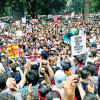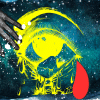Growing up a third culture kid in Bangladesh

During a parent-teacher meeting, my mother spent an unusually long time listening to unsettling words from my teacher.
I was falling behind in language acquisition; when I spoke, I was often incomprehensible and my writing was equally illegible. Little did the teacher know that I was trying to absorb two dominant realities – the foreign language spoken by my mother and the Bengali culture and Bangla practised by my father – and that it was normal for someone like me to have difficulty in the language department.
Initially, these situations create a state of confusion for many as the essence of both languages seep in unfiltered. Later on, this quality has the potential to become a strength.
For third culture kids, or TCKs, there is a constant and simultaneous oscillation between the different "places of belonging", like a pair of antagonistic muscles. The term was coined by sociologist and anthropologist Ruth Hill Useem, and can present itself in various scenarios.
Your mother could be from one country and father from another, but you live somewhere else entirely; both your parents could be from the same place but you live in a different place; you could be born somewhere, your mother and father could be from different places themselves but you live in one of their countries of origin.
For me, the answer to "Where are you from?" becomes long and convoluted. It's one that I keep moulding. It can sometimes feel liberating, being able to shape an identity for yourself. Having an exposure to multiple philosophical, political and social perspectives and the difference in values allow me to create a personal value system.
Like the cautious observer, you take conscious note of verbal and non-verbal cues. Sometimes you miss the humorous reference and have to pluck up the courage to ask someone in the group for an explanation. People are surprised to hear me talking about a Bengali folk singer for instance. Sometimes I forget something simple but on the other hand will know many things characteristically distinct to Bangladesh.
I will find myself gaining unique skills to demonstrate to one half of the family, almost like show-and-tell, such as how to cut open a jackfruit, how to bargain, how to swerve through busy streets, how to wholeheartedly defend spicy food and so on. I follow the local newspapers of two countries and resort to Radio Garden to listen to my passport country's radio. When I visit my mother's country, I try to fill myself in on all the things I had missed – pop culture references, opening of a new restaurant, my aunt's new job and a new parliament bill about to be passed. I have developed a strange taste in music that can only be described as patchwork. Nearly everything else becomes a patchwork too, threads of contrasting colours woven together.
As a cultural chameleon, "home" and "identity" are tough terms to describe but they grant their own freedom and beauty and a suitcase of experiences never to be taken for granted.
Bianca is trying to get herself going on walks in the morning. Reminder to do that at [email protected]

 For all latest news, follow The Daily Star's Google News channel.
For all latest news, follow The Daily Star's Google News channel. 









Comments